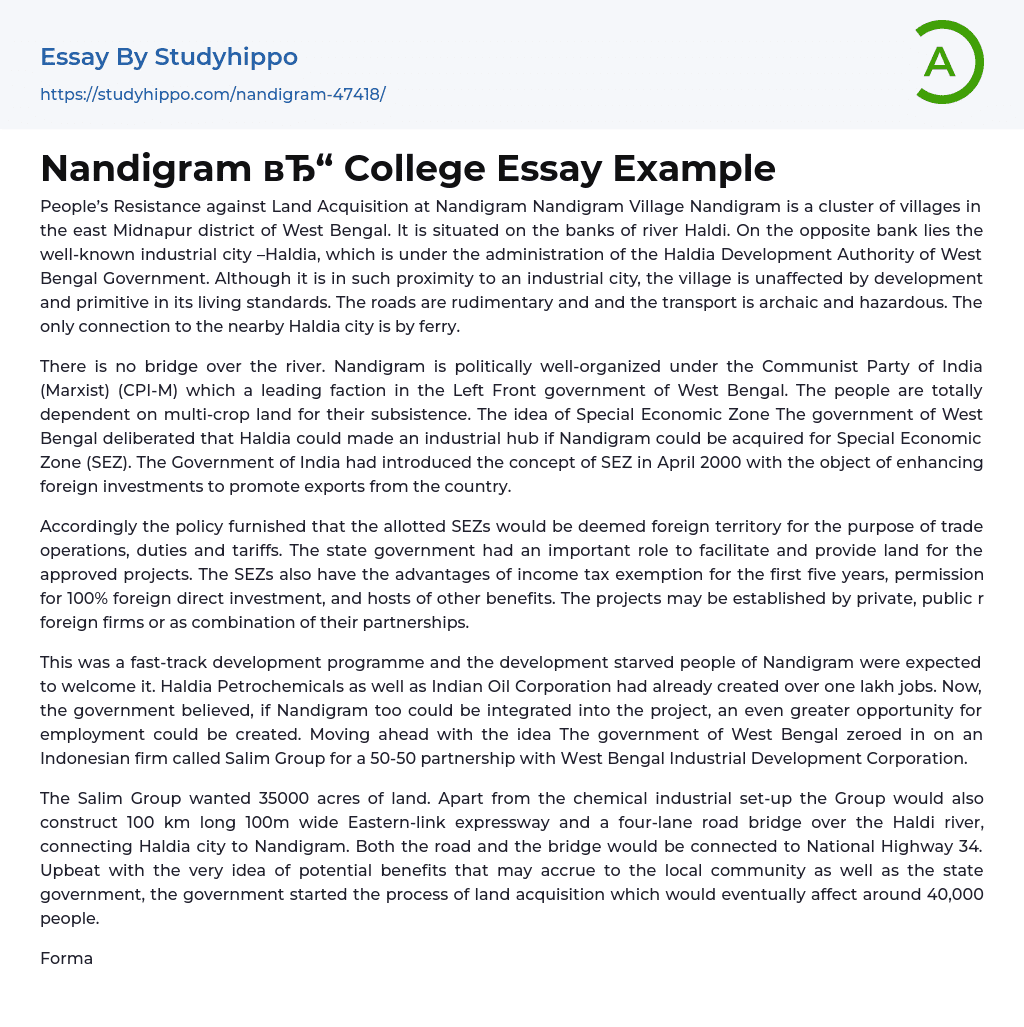Nandigram, located on the banks of river Haldi in West Bengal's east Midnapur district, is a cluster of villages. Despite its close proximity to the industrial city of Haldia, which falls under the administration of the Haldia Development Authority of West Bengal Government, Nandigram lacks development and basic living standards. The roads are rough and transportation options are outdated and dangerous. The only way to reach nearby Haldia city is by ferry.
The bridge over the river is non-existent. Nandigram, which is politically organized and belongs to the Communist Party of India (Marxist) (CPI-M), a prominent faction in West Bengal's Left Front government, has residents who depend on multi-crop land for their livelihoods. The government of West Bengal acquired Nandigram for a Special Economic Zone (SEZ) with hopes of turning Haldia into an industrial hub. In April 2000, the Government of India in
...troduced SEZ to attract foreign investments and enhance exports.
The policy states that the approved SEZs will be considered as foreign territory for trade operations, duties, and tariffs. The state government plays a vital role in assisting and providing land for these projects. The SEZs offer benefits such as income tax exemption for the first five years, permission for 100% foreign direct investment, and various other advantages. The projects can be initiated by private, public, or foreign firms, or through partnerships involving these entities.
This fast-track development programme aimed to provide employment opportunities to the underdeveloped people of Nandigram. Haldia Petrochemicals and Indian Oil Corporation had already generated over one lakh jobs, and the government believed that including Nandigram in the project would create even more employment opportunities. To achieve this, the
government of West Bengal partnered with Salim Group, an Indonesian firm, through a 50-50 partnership with West Bengal Industrial Development Corporation.
The Salim Group requested 35,000 acres of land, with plans to build a chemical industrial set-up. Additionally, the group intended to construct a 100 km long and 100m wide Eastern-link expressway and a four-lane road bridge over the Haldi river, connecting Haldia city to Nandigram. These transportation projects would be linked to National Highway 34. In anticipation of the potential benefits for the local community and state government, the government began the process of acquiring land, which would impact approximately 40,000 individuals.
The Anti-Land Acquisition Committee, known as Bhumi-Uchchhed Pratirodhi Committee (BUPC), was formed in response to the government's land acquisition process. Political divisions became evident on the ground, leading to the formation of like-minded groups and the emergence of BUPC. The movement was initiated by activists from various political parties including Trinmool Congress, splinter groups from CPI (M), Forward Block, as well as Naxalites and Maoists.
The main goal of BUPC was to prevent the government from acquiring land in Nandigram using any means necessary and to protect the traditional livelihoods of the village residents. However, by 2007, the situation deteriorated as both the state government and BUPC took a firm stance. On 15 March 2007, 11 individuals were fatally shot by the state police during a confrontation between activists and the government regarding the land takeover. Additionally, 50 people sustained injuries as a result of the police intervention.
In October, armed activists of CPI (M) entered Nandigram, causing 25,000 villages to seek refuge in nearby villages due to fear. During a clash
between BUPC and CPI (M) activists, two people lost their lives. There were more deaths in December in another fight between BUPC and CPI (M) activists. The violent incidents received global criticism. Under immense pressure, the government relocated the SEZ venue to Nayachar, 30 km away from Haldia. (Source: Albuquerque, D. (2010). Business Ethics: Principles and Practices. New Delhi: Oxford University Press) Course Outlines Ethics Course Outlines Ethics: Meaning, Evolution, Definition and Scope
Ethical concerns in the business world encompass a range of issues such as honesty, fairness, integrity, discrimination, corruption, fraud, insider trading, environmental problems, intellectual property rights, sexual harassment and privacy matters. These concerns are vital for upholding ethical standards in business practices. Examples of these concerns include manufacturers' obligations towards consumer rights and the promotion of ethical consumption.
- Professor essays
- Should College be Free essays
- Should college athletes be paid essays
- College Education essays
- College Tuition essays
- Graduation essays
- College Goals essays
- Personal Statement essays
- Online Classes Vs Traditional Classes essays
- Online Education essays
- Student Loan essays
- Study Abroad Scholarship essays
- Reasons To Go To College essays
- Paying College Athletes essays
- Technology In The Classroom essays
- Federal government essays
- Armed Forces essays
- Confederate States Of America essays
- Federal Government Of The United States essays
- Fourteenth Amendment To The United States Constitution essays
- Governance essays
- Parliament essays
- Politics essays
- Jurisdiction essays
- Bureaucracy essays
- Separation Of Powers essays
- Congress essays
- President essays
- United States Congress essays
- Non-Commissioned Officer essays
- Appeal essays
- Revenge essays
- Corporate Governance essays
- Public Service essays
- Income Tax essays
- Supply essays
- Red Cross essays
- Democracy essays
- State essays
- Liberty essays
- Absolutism essays
- Reform essays
- Republic essays
- John Marshall essays
- Bourgeoisie essays
- Developed Country essays
- Elections essays
- International Relations essays
- Left-Wing Politics essays
- Monarchy essays




